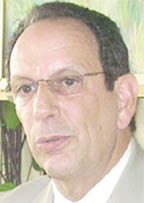The lawyer for Robert Simels, the former Roger Khan attorney now accused of attempting to ‘neutralise’ witnesses, is seeking to have the indictment dismissed, saying that the US attorney lacked sufficient cause to violate attorney-client privilege.

The US Attorney’s office is currently completing its disclosure to the defence team of audio and video recorded conversations between Simels, his assistant Arianne Irving and Khan, the drug accused businessman whom he was defending in a trafficking in narcotics case. The US government has signalled its intention to use the recordings, which were made at the Metropolitan Correctional Centre, after minimising privileged communication. Simels, Irving and Khan are charged with conspiracy to tamper with witnesses scheduled to testify in the drug trial and Simels is among other things accused of paying US$1,000 and discussing “eliminating and neutralising” witnesses.
But Henry Mazurek has given notice to presiding Judge John Gleeson of his intention to file a motion to dismiss the indictment against Simels on ‘due process’ grounds, citing the government’s “conduct to invade the attorney-client relationship and privilege without sufficient cause to believe that Mr Simels was engaged in criminal conduct.” He will also file a motion to sever Simels’ charges from Khan and motions to suppress evidence seized during the search of the attorney’s office and recordings of conversations between him and Khan at the MCC.
In a letter to Gleeson outlining the US government’s disclosure, US Attorney Benton Campbell said that on July 7 a District Judge authorised the interception of oral communications that occurred in the attorney’s visiting room at the MCC, between Khan and his lawyers, Simels and Irving.
Also, a separate order was made on the same date authorising the video-taping of the meetings. The order authorising the intercept included a privilege screen procedure. It required that the meetings between the defendants be recorded but not contemporaneously monitored. The recordings are to be reviewed and minimised of non-pertinent and privileged conversations and only those portions of the conversation deemed to be pertinent would be turned over to the prosecuting team.
But Mazurek claimed that the intercepted material should be given the protection that was accorded to material seized from Simels’ New York office. In that instance, it was agreed between the defence and the prosecution that the defence would have an opportunity to review the seized materials and raise their claims before any material is handed over to the prosecution. Mazurek argues that the same principle should be applied to the video and audio recordings, saying that there is no reason to give “lesser protection to the review of the intercepted conversations between Mr Simels and his client than what the parties agreed would be appropriate in reviewing materials seized from his law offices.”
Mazurek also disclosed that Khan refuses to waive any attorney-client privilege or work product protection that he maintains over materials related to his representation by Simels and Irving in his narcotics case. “Mr Khan’s continued assertion of the privilege leaves counsel for Mr Simels in a difficult position. On the one hand, we need to review all these materials – and potentially publish them during pre-trial proceedings or at trial- to adequately defend Mr Simels on the charges pending in this indictment. On the other hand, we are still bound by the new York Lawyer’s Code of Professional Responsibility to honour the attorney-client privilege and work product doctrine…” Mazurek said in his letter.
According to the lawyer, the issue in the case is particularly “acute” because “the potential privileged material and work product generated by Mr Simels and Mr Irving on behalf of Mr Khan in defence of his underlying narcotics case includes considerable defence strategy and work product – a veritable “road map” of Mr Khan’s defence at trial.” He noted that should the information be disclosed in the defence of Simels case it would be highly prejudicial to Khan as he prepares for trial “on charges for which he faces a potential life term of imprisonment.”
Meanwhile, Gleeson last week granted a government application to have David Wikstrom appointed as the Special Master to review the computer data and files contained on storage media seized from the search of Simels’ law office.
The government and Simels have agreed to split the fees and cost of the special master who is expected to determine which seized materials are ‘Khan-related’ and which are ‘non-Khan-related.’ But the extraction and processing of the computer files will be performed by the forensic computer laboratory of the Drug Enforcement Agency (DEA) using directory searches, word searches and other forensic tools provided that the DEA personnel do not share any information with other agents handling the Simels prosecution or the Khan case.
It is alleged that Simels and Irving had numerous discussions with a US government informant, to locate certain individuals close to the cases and to get them to rescind statements, to not testify against Khan and to have them “eliminated.” The informant with whom the two had discussions, listed as reliable in court documents as information from him has led to drug busts in the past, was also asked to testify for Khan during the trial.
The next hearing in the case is set for December 12, while the next status conference will be held on January 9, 2009.





